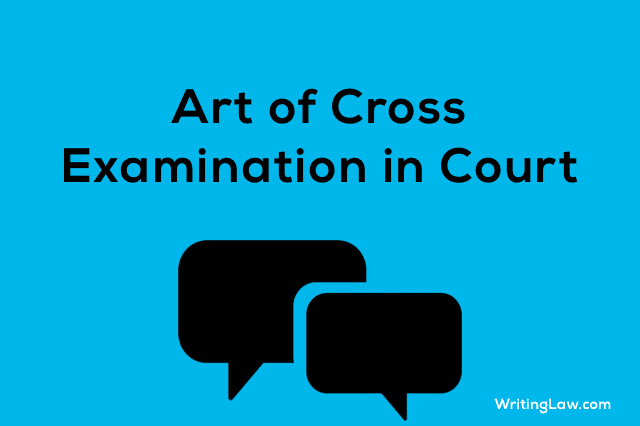
Art of Cross-Examination
Chapter X of the Evidence Act, 1872 deals with the examination and cross-examination of witnesses before the court of law. The relevant sections are Section 136 to Section 166 of the Evidence Act. Section 137 tells about examination-in-chief and cross-examination of a witness.
Examination of a Witness in Court
Examination-in-chief: The examination of a witness who calls him.
After examination-in-chief, the examination of the witness by an opposite party is called cross-examination.
The examination of a witness subsequent to cross-examination is called re-examination.
The re-examination can be made to explain a matter stated in examination-in-chief, and if some new matter is narrated in the re-examination, the adverse party can again cross-examine about new matters.
Leading question is mentioned in Section 141 of the Indian Evidence Act. Any question suggesting an answer that the person putting it wishes or expects to receive is called a leading question.
Motive of Cross-Examination
The art of cross-examination is the most effective weapon for the discovery of truth, provided the objective is not to confound a truthful witness but to extract the truth from an unwilling witness.
Unfortunately, trials in this country don’t take place in the manner that they are required to be conducted. One witness or half the witness is examined today, and then the same witness comes after three months when examination in chief is over and forgotten, then the lawyer is supposed to cross-examine. It serves no purpose at all.
If you put so much interval between examination and cross-examination, the fellow goes and gets his best advice and gets ready for cross-examination. It happens almost invariably now. That is the state.
Effective Cross-Examination
Cross-examination needs humour, imagination, confidence, and bearing (self-control and patience).
There are no fixed questions for cross-examination. Questions to cross-examine a witness vary from case to case and man to man.
The age, position, status, expression in court, experience, qualification, expertise, etc., are subject to cross-examination. Questions get changed as per the response of the witness on the spot. The testimony of the child witness usually is not believed without corroboration because he can be tutored. But the testimony of an adult man, if reliable, is sufficient to convict an accused.
Can a Party Cross-Examine His Witness?
Yes, when a witness turns hostile (Section 154 of the Indian Evidence Act) and makes a statement against the party who calls him, he can be cross-examined by his own party with the court’s permission.
Preparation for Cross-Examination
1. The defence lawyer should prepare himself for cross-examination in advance. He should read the whole challan, FIR, police statements, seizure memo, forensic report, and all police documents.
2. He should also know the ingredients of the offence with which the accused is charged.
3. He should also prepare his defence in the case so that he will be ready to point out omissions and contradictions during examination in chief.
Remember that if a defence lawyer fails to point out ‘omission and contradiction’ during his cross-examination, then he will not be allowed to point this out in the future. So be careful at this point as it is the biggest art.
In case the witness is re-examined in the future, the defence lawyer will have the opportunity to cross-examine the witness to the point of omission and contradiction.
In cross-examination, the truthfulness of the witness is challenged by asking questions about his status in life, his previous conduct, his previous conduct of conviction, etc.
Some Effective Tips for Cross-Examination
1. Please keep it simple.
2. Keep it short.
3. Only ask questions that help you.
4. Avoid open-ended questions.
5. You should know when to quit.
6. Build perfect timings for a sensible move.
Read Next:
1. Advocates Act, 1961
2. 5 Types of Court Opinions and Their Significance
3. What Is Court Demeanour and the Tips to Maintain It?
- 18 Most Important Amendments to the Indian Constitution - 12th August 2023
- 8 Kinds and Theories of Punishment - 22nd July 2023
- What Is the Meaning of Res Judicata in Civil Procedure Code - 22nd January 2023








Article though well written has left me thirsty.👍
Hahaha. Yes. It happens sometimes. Thank you for being a long and constant reader and supporter of WritingLaw. 😊